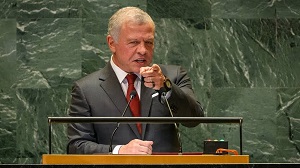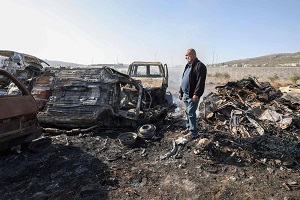Six years on, Jordan’s sovereignty move over Baqoura, Ghumar still defines its diplomacy
The Jordan Times
AMMAN — Jordan marks six years since restoring full sovereignty over Baqoura and Ghumar, a decision widely seen as one of the Kingdom’s most assertive diplomatic steps in recent decades.
His Majesty King Abdullah ended the special regime in 2018, closing 25 years of Israeli use and reaffirming Jordan’s firm stance on territorial rights at a time of shifting regional dynamics.
Baqoura and Ghumar carry a long and sensitive history. Baqoura spans 820 dunums at the meeting point of the Jordan and Yarmouk rivers. The area fell under Israeli control in the early years following the 1948 conflict and was later included under a special arrangement in the 1994 Wadi Araba Peace Treaty.
Ghumar, covering 4,235 dunums in Wadi Araba, remained under Israeli control following the 1967 war until it was returned to Jordan under the peace treaty. Both areas were returned to Jordan under the treaty but remained under a 25-year annex that required renewal. Jordan notified Israel in advance that it would not renew the arrangement.
When the annex expired, the King announced that Jordan had imposed “full sovereignty on every inch of Baqoura and Ghumar.” Shortly after, His Majesty visited both sites with HRH Crown Prince Hussein and prayed on the reclaimed land. The visit carried strong symbolic weight and marked the conclusion of a long-awaited process for many Jordanians.
The end of the arrangement shifted national attention from political sovereignty to development.
In 2022, the Jordan Armed Forces–Arab Army launched a major agricultural project in Ghumar. The initiative introduced updated irrigation systems and new agricultural practices aimed at boosting production and supporting local farmers. Officials say the second phase will expand climate-smart techniques to increase output and strengthen food security. During a field visit, the King said the reclaimed land should become a “Jordanian success story”.
Political analyst Nedal Abu Zaid said the restoration “clearly reflected Jordan’s quiet diplomatic approach,” noting that the Kingdom has never relied on “noisy or confrontational diplomacy.”
He said Jordan treated Baqoura and Ghumar as part of its broader national-security framework, using calm and methodical diplomacy to ensure the full return of its land despite Israeli persistence.
Abu Zaid added that Jordan’s professionalism, legal clarity and reliance on international partnerships strengthened its position throughout the process.
For columnist and political commentatorAmerSabaileh, internal assessments in Amman indicated that relations with the Israeli government had entered “a phase of political chill”. He said this cooling of ties shaped the environment in which Jordan made its decision.
According to Sabaileh, reclaiming Baqoura and Ghumar was “a direct translation of that chill” and reflected a sovereign step aligned with Jordan’s strategic interests.
Six years later, Baqoura and Ghumar remain a strong symbol of Jordan’s sovereign approach and measured diplomacy.
Analysts say the restoration demonstrates how legal precision, national consensus, and firm leadership can produce lasting achievements, reinforcing Jordan's reputation for calm, disciplined, and strategic diplomacy in a complex region.
Latest News
- Vietnam flood death toll rises to 90 — environment ministry
-
 Former CIA officer: Nobody knows the Middle East like King Abdullah II does
Former CIA officer: Nobody knows the Middle East like King Abdullah II does
-
 Gaza civil defence says 21 killed in Israeli strikes
Gaza civil defence says 21 killed in Israeli strikes
-
 Hamas Delegation in Cairo to Discuss Gaza Ceasefire
Hamas Delegation in Cairo to Discuss Gaza Ceasefire
-
 Israel’s Netanyahu Vows to Keep Striking Hamas and Hezbollah
Israel’s Netanyahu Vows to Keep Striking Hamas and Hezbollah